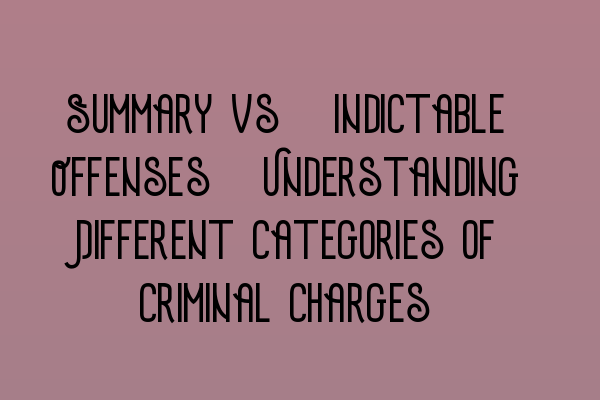Summary vs. Indictable Offenses: Understanding Different Categories of Criminal Charges
When someone is charged with a criminal offense, it is important to understand the nature of the charge and the corresponding legal procedures. In the UK, criminal charges are typically categorized as either summary offenses or indictable offenses. This classification has significant implications for how the case proceeds through the criminal justice system.
Summary Offenses
Summary offenses are less serious criminal charges that are dealt with in the Magistrates’ Court. These offenses often involve minor criminal activity, such as petty theft, public intoxication, or disorderly conduct. Summary offenses are usually less complex and carry lower penalties compared to indictable offenses.
In most cases, summary offenses are heard by a panel of lay magistrates or a district judge. The trial process is typically less formal and quicker than for indictable offenses, with the focus on reaching a speedy resolution. If found guilty, the defendant may face fines, community service, or a short period of imprisonment.
It is important to note that some offenses, despite being categorized as summary offenses, can be elevated to the Crown Court for trial if the circumstances warrant it. This is known as “sending a case to the Crown Court for sentence.”
Indictable Offenses
Indictable offenses are more serious criminal charges and are heard in the Crown Court. These offenses encompass a wide range of crimes, including robbery, murder, rape, and fraud. Indictable offenses are generally more complex and carry harsher penalties due to their severity.
Unlike summary offenses, indictable offenses involve a more formal trial process. A judge and jury preside over the proceedings, and the trial may take longer to reach a verdict. The burden of proof is higher in indictable offenses, requiring the prosecution to present compelling evidence to convince the jury of the defendant’s guilt “beyond a reasonable doubt.”
If convicted of an indictable offense, the defendant may face substantial fines, longer prison sentences, and other punitive measures depending on the severity of the crime. In some cases, the judge may also consider factors such as prior convictions and the impact on the victims when determining the appropriate sentence.
Understanding the Differences
It is crucial to understand the differences between summary and indictable offenses to navigate the legal process effectively. The category of the offense will dictate which court hears the case, the trial procedure, and the potential consequences.
If you or someone you know is facing criminal charges, it is advisable to seek legal representation from an experienced criminal solicitor. They will guide you through the complexities of the legal system, ensuring that your rights are protected and that the best possible defense is presented.
Related Articles
Keywords: summary offenses, indictable offenses, criminal charges, Magistrates’ Court, Crown Court, legal procedures, lay magistrates, district judge, formal trial process, burden of proof, legal representation, criminal solicitor
